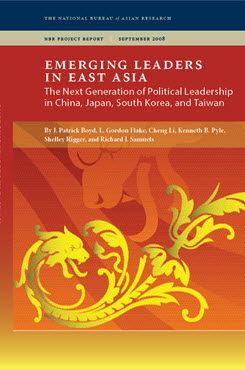From Emerging Leaders in East Asia: The Next Generation of Political Leadership in China, Japan, South Korea, and Taiwan
Rising Rationalists
The Next Generation of Leadership in Taiwan
This essay describes the rising generation of political leaders in Taiwan—those born between about 1958 and 1975—as well as the major forces shaping the generation and the distribution of political views within it.
EXECUTIVE SUMMARY
This essay describes the rising generation of political leaders in Taiwan—those born between about 1958 and 1975—as well as the major forces shaping the generation and the distribution of political views within it.
MAIN FINDINGS
Taiwan’s rising generation of leaders is more moderate and pragmatic, and less ideological, than the current leadership. The young politicians will adopt a less challenging posture toward the PRC. These leaders do not support unification on Beijing’s terms and will attempt to avoid such an outcome. They will emphasize stabilizing the cross-Strait political relationship and enhancing economic cooperation. Trends in public opinion will reinforce the efforts of elites to move Taiwan in this direction. The rising generation’s political orientation is the product of its having reached political awareness during Taiwan’s democratic transition and opening to China.
POLICY IMPLICATIONS
- The new generation of leaders will be less inclined to push the envelope on cross-Strait relations but is unlikely to surrender to Beijing’s demands. Whether or not cross-Strait tensions ease will depend on the PRC government’s willingness to postpone unification.
- The new leaders will not push for unification but probably will align Taiwan more closely with the PRC than ever before, especially in the economic realm.
- The new leaders will seek to maintain good relations with Washington while also trying to avoid dependence on the U.S.


